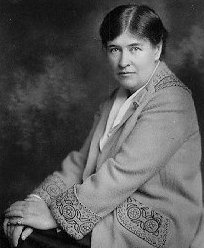|
Her Shadows on the Rock (1931) won the first annual Prix Femina
Americaine.
One of Ours, a war novel published in 1922, won her
the Pulitzer Prize. The Cather family home, built in 1879 and restored
in the 1950s, is described in exacting detail in her novel The Song
of the Lark (1915). The town of Red Cloud has extensively commemorated
her. Left unsaid is the fact that Willa was a lesbian, who when she was
fourteen made up a male persona for herself ("William Cather, Jr."), cut
her hair to crew-cut length, and liked to wear boy’s clothes, which she
did more openly as an adult living in the East. The Willa
Cather Pioneer Memorial and Educational Foundation maintains her childhood
home and several other buidlings, has displays on her life and works, offers
a walking tour of Red Cloud, and sponsors driving tours of the area. You
can also walk the streets of Red Cloud and get a feel for the time and
places captured in her works. A state historical marker fifteen miles north
of town commeorates her, and a huge plow outside of Red Cloud identifies
the town as her home. South of town is the commemoration Willa would probably
like best, the Willa
Cather Memorial Prairie, a 610-acre virgin prairie ecosystem named
for her, established in 1974 and maintained in its natural state by the
Nature Conservancy.
Willa first moved to
New York in 1914. She was thirty-one, a teacher, journalist and published
poet, and was hired as an editor at McClure’s magazine. She rose to be
managing editor of McClure’s, then resigned to write full-time. From 1932
until Willa’s death in 1947 they lived quietly in New York City, not interested
in the social ferment of their times, although Willa developed a keen interest
in music. After Willa's death in 1947, Edith stayed in their apartment
in New York, keeping to the terms of her will, which included destroying
Willa's letters, and keeping her novels from being made into movies. She
is rarely if ever mentioned in the commemorations of Cather.
Willa came to Jaffrey
Center, New Hampshire to write in the summers, and returned to the Shattuck
Inn for 20 years. To maintain her privacy she is said to have arrived by
the back door and gone directly to her third floor rooms, which faced the
mountains. She used a tent in the woods as her studio, writing in the autumn
chill. It is there that she wrote parts of My Antonia, Death
Comes For the Archbishop, Shadows on the Rock, and One of
Ours. The hurricane of 1938 wiped out the fir trees, and after that
she did not return. She did, however, request to be buried here, perhaps
because of the tranquillity of the surroundings. Her grave stands at the
bottom of the slope in the far southwest corner of the Old
Burying Ground Cemetery. Her marker reads "The truth and clarity of
her great spirit will live on in the work which is her enduring gift to
the country and all its people," and includes a quote from her novel My
Antonia. Edith is buried next to Willa, her small footstone marked only
with her name and dates. The Shattuck Inn was torn down in 1996.
For specific travel information about these sites, check the "Travel
Resources" page.
|
